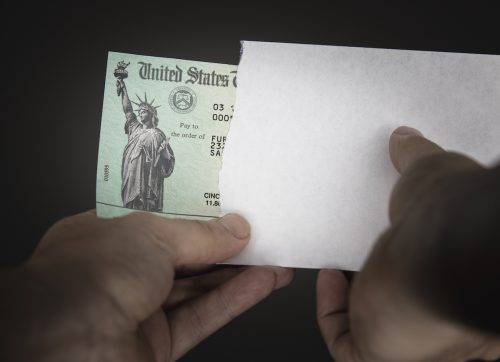If You Just Got This Stimulus Check Email From the IRS, Don't Open It
You could be at risk for identity theft if you click on this message.

Millions of Americans have received stimulus checks over the last two years, after the U.S. government authorized three separate payments for eligible recipients to help aid financial burdens brought on by the COVID pandemic. Despite many officials and citizens encouraging more payments, experts have long cautioned that the chances of another stimulus check nationwide are not likely. But that has not stopped scammers from trying to capitalize on Americans' desire for more money from the government. In fact, the Federal Trade Commission (FTC) has just warned people that they may have already received an email about stimulus checks from these con artists. Read on to find out what email you should be on the lookout for in your inbox.
RELATED: If You Get This Email From Amazon, Delete It Immediately.
If you recently got an email about the third stimulus check, don't open it.

The FTC issued a new warning on Oct. 27, informing consumers that scammers are now sending fake IRS emails about the third stimulus check. Per the warning, the email states that you can get a third stimulus payment by clicking on a link that lets you "access the form for your additional information." Unfortunately, opening this email won't get you more money from the government.
"But the link is a trick," Cristina Miranda, an official for the IRS' Division of Consumer and Business Education, writes in the warning. "If you click it, a scammer might steal your money and your personal information to commit identity theft. It's yet another version of the classic government impersonator scam."
RELATED: If You Get This Message from Your Bank, Contact Authorities, FBI Says.
Most people eligible for a third stimulus check already received it.

The IRS started sending out the third stimulus check, also known as the third round of economic impact payments, in March 2021. These checks were based on 2020 tax returns, and most eligible people did not need to take any additional action to get their third payment. In fact, the vast majority of people have already received it. According to the IRS, 96 percent of eligible recipients got their third check by the end of April.
There may be a chance you haven't gotten yours or are being sent an additional payment because you were owed more money than was originally calculated. But the IRS won't send you an email. The agency says they "continue to send Economic Impact Payments weekly" this year as these returns are processed.
"If you didn't receive one yet, it doesn't mean you won't," the agency says. "The IRS doesn't initiate contact by email, text messages or social media channels to request personal or financial information—even information related to the Economic Impact Payment."
There have been thousands of stimulus-related scam reports.

According to data from the FTC, there have been more than 270,000 COVID and stimulus-related fraud reports over the last two years and more than 187,000 subsequent identity theft reports. And even though the last round of stimulus checks was delivered by the end of spring, the IRS reported an uptick in these scams over the summer.
"The number of reported scam attempts reached levels we haven't seen in more than a decade. More than ever, it is important for taxpayers to continue to protect their personal information and not fall victim to these scams," Jim Lee, Chief of IRS Criminal Investigation, said in an Aug. 30 statement.
If you believe you have been sent a scam IRS email, the FTC asks that you report government impersonators to the agency. "Your report makes a difference. Reports like yours help us investigate, bring law enforcement cases, and alert people about what frauds to be on the lookout for so they can protect themselves, their friends, and family," the FTC states.
RELATED: For more up-to-date information, sign up for our daily newsletter.
There are ways to avoid these types of scams.

The best way to avoid getting scammed by government imposters is knowing the red flags. The FTC says that the government will never email you to offer help in getting a stimulus check, nor will they call, text, or contact you on social media.
"If you get a message with a link from someone claiming to be from the IRS or another government agency, don't click on it. It's a scam. Scammers will often send fake links to websites or use bogus email addresses and phone numbers that seem to be from the government," the FTC says. If anyone contacts you claiming to be from the IRS or another government agency asking for your personal or financial information, you should avoid sharing any of it, especially your Social Security, Medicare ID, driver's license, bank account, or credit card numbers.
RELATED: If You Get This Message from T-Mobile, Delete It Immediately, Experts Say.





















